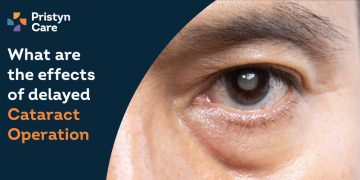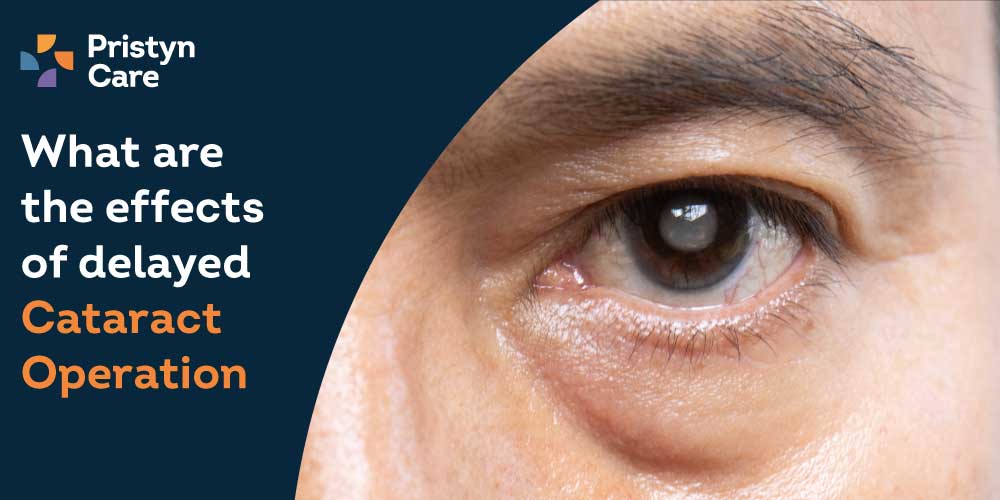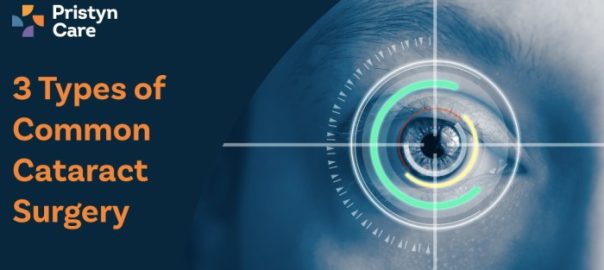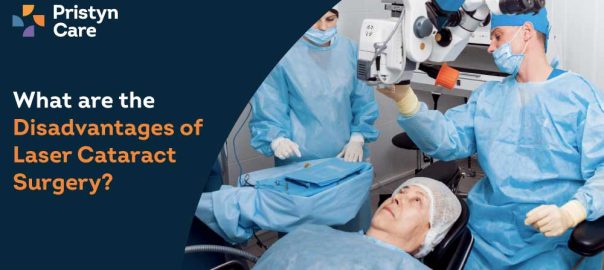![]() Views: 335
Views: 335
What Are The Effects Of Delayed Cataract Operation?
At Pristyn Care, our team of skilled ophthalmologists uses the latest advancements in cataract surgery to ensure optimal outcomes with minimal recovery time. Contact us to discuss how prompt treatment can preserve your vision and quality of life.
Dedicated Support at Every Step!
Our Doctors are available 24 hours a day, 7 days a week to help you!
Call Us0806-541-7961Cataracts cloud the clear lens of your eyes, making it like looking through a foggy window. They develop mostly due to ageing but can also result from injury, sunlight exposure, or health issues like diabetes. Although they start small, without timely treatment, cataracts can severely affect your vision, making everyday activities challenging.
Timely cataract surgery is crucial. It's a safe, quick procedure where the clouded lens is replaced with a clear artificial one, restoring vision effectively. Delaying this can lead to worsened sight and complicate the surgery. Therefore, getting surgery as recommended by your doctor helps maintain your vision and overall quality of life.
Table of Contents
Understanding Cataracts
Cataracts develop when the clear lens of your eye becomes cloudy, significantly reducing your quality of vision. This condition primarily affects those who are ageing, but there are several other factors that contribute to its development.
Causes of Cataracts
- Age: The most common cause, as the proteins in the lens degrade over time.
- Medical conditions: Such as diabetes, which can accelerate cataract formation.
- Environmental factors: Long-term exposure to ultraviolet sunlight and radiation.
- Lifestyle choices: Smoking and alcohol use can increase the risk.
- Genetics: Family history can play a crucial role.
- Medication: Prolonged use of steroid medications is linked to cataracts.
Symptoms and Diagnosis
- Blurred Vision: Vision may become cloudy or dim, as if looking through a foggy window.
- Glare Sensitivity: Increased sensitivity to light, making it difficult to see in bright light or at night.
- Colour Changes: Colours may appear faded or yellowed.
- Double Vision: Seeing double when one eye is closed.
- Frequent Prescription Changes: Needing frequent updates in eyeglass or contact lens prescriptions.
- Diagnosis: Diagnosed via a comprehensive eye exam, including tests such as visual acuity, dilated eye exam, and tonometry to assess the impact on vision.
No Cost EMI, Hassle-free Insurance Approval
Immediate vs. Delayed Surgery
Deciding on the timing for cataract surgery is crucial and depends on how significantly the cataracts affect your daily activities.
Recommended Timing for Cataract Surgery
Cataract surgery is recommended when the quality of your life is affected; this could mean trouble with daily activities such as reading, driving, or facing increased risks of falls and accidents due to poor vision.
The surgery involves removing the clouded lens and replacing it with a clear, artificial lens. This procedure is typically performed on an outpatient basis and is known for its high success and safety rates.
Common Reasons for Delaying Surgery
- Fear of Surgery: Anxiety about undergoing an operation.
- Misunderstanding the Condition: Not realising the progressive nature of cataracts.
- Financial Concerns: Worries about the cost of surgery, especially if insurance coverage is inadequate.
- Access to Care: Difficulty accessing healthcare facilities or finding the right surgeon.
- Lack of Symptoms: In early stages, cataracts might not cause significant vision problems, leading individuals to delay treatment.
Understanding both the nature of cataracts and the implications of surgery timing can help in making informed decisions about managing this common but treatable condition.
Physical Effects of Delaying Cataract Surgery
Delaying cataract surgery can have significant and sometimes irreversible effects on your vision. As cataracts progress, they not only deteriorate vision but also complicate potential treatment outcomes. Here are some of the key physical effects:
Progression of Visual Impairment
- Gradual Increase in Cloudiness: As cataracts mature, the lens of the eye becomes increasingly opaque, severely reducing visual clarity.
- Diminished Night Vision: Cataracts can make it difficult to see in low light conditions, impacting nighttime activities.
- Increased Light Sensitivity: Individuals may experience discomfort or see halos around lights, complicating daily activities like driving.
Increased Risk of Complications During Surgery
- Challenging Surgical Procedure: The denser and more mature the cataract, the more difficult it is to remove, which can increase the risk of surgical complications.
- Potential Damage to Surrounding Eye Structures: Advanced cataracts require more invasive procedures, raising the risk of damaging surrounding tissues, including the retina and the capsule that holds the lens.
- Longer Recovery Time: With advanced cataracts, the post-surgery recovery can be longer and more uncomfortable.
Potential for Irreversible Blindness
- Severe Vision Loss: If left untreated for too long, cataracts can lead to hypermature cataracts, where the lens becomes extremely hard and white, a condition known as a mature or "overripe" cataract.
- Irreversible Damage: In extreme cases, prolonged delay can lead to complications such as phacomorphic glaucoma, where the swollen lens leads to increased intraocular pressure, potentially resulting in irreversible damage to the optic nerve and permanent vision loss.
Psychological and Social Implications
The impact of cataracts extends beyond physical vision loss, affecting mental health and social interactions significantly.
Impact on Mental Health
- Increased Anxiety and Depression: Struggling with vision loss can lead to feelings of anxiety and depression as individuals become worried about their decreasing independence and potential future blindness.
- Frustration and Stress: As everyday tasks become more challenging, the constant struggle can lead to heightened stress and frustration levels.
Effects on Social Interactions and Isolation
- Withdrawal from Social Activities: Difficulty in seeing can cause individuals to withdraw from social activities they once enjoyed, leading to social isolation.
- Impaired Communication: Vision impairment can hinder non-verbal cues in communication, further isolating individuals from engaging interactions.
- Dependency on Others: As vision worsens, dependence on others for basic daily activities can strain relationships and reduce the individual's sense of autonomy.
Economic and Lifestyle Impacts
The decision to delay cataract surgery can have profound economic and lifestyle consequences, affecting everything from daily functionality to financial stability.
Challenges in Daily Activities and Mobility
- Reduced Visual Acuity: Difficulty in reading, driving, and recognizing faces, complicating everyday tasks.
- Mobility Issues: Increased risk of falls and accidents due to impaired vision, especially in low-light conditions.
- Inability to Work: Vision impairment can hinder job performance, especially in visually demanding jobs, potentially leading to job loss or reduced working hours.
Financial Burden from Advanced Surgical Needs
The longer cataract surgery is delayed, the more complex and resource-intensive the required procedures can become. Advanced cataracts might need more sophisticated surgical techniques, which are not only riskier but also costlier.
This includes higher costs for specialised equipment and lenses, potentially higher fees from more experienced surgeons, and extended post-operative care, including medications and additional visits to healthcare providers.
Dependency on Others for Routine Tasks
As cataracts progress, the loss of visual independence often leads to increased reliance on family, friends, or professional caregivers for routine tasks like cooking, shopping, and transportation.
This dependency can strain personal relationships and increase the psychological burden on the patient, further escalating the social and economic costs associated with delayed treatment.
Managing Risks of Delayed Surgery
Effective management of cataracts involves regular monitoring and understanding when surgery becomes a necessity to avoid irreversible damage.
Monitoring Cataract Progression
Regular check-ups with an ophthalmologist are crucial for tracking the progression of cataracts. These examinations help assess how quickly the cataracts are developing and the impact on vision quality, guiding timely decisions about surgery.
When to Decide Surgery is Unavoidable
Surgery becomes essential when the quality of life is significantly compromised, or if there is a risk of permanent vision loss. Factors influencing this decision include difficulty performing daily tasks, such as driving and reading, and the potential for accidents due to impaired vision.
Latest Advancements in Cataract Surgery for Advanced Cases
- Laser-Assisted Surgery: Provides greater precision in cataract removal, especially useful in complicated cases.
- Advanced Intraocular Lenses (IOLs): These lenses offer improved vision outcomes, including multifocal IOLs that provide near, intermediate, and far focus, reducing the need for glasses post-surgery.
- Minimally Invasive Techniques: Reduce recovery time and lower the risk of complications, making surgery safer even for advanced cataracts.
Conclusion
Delaying cataract surgery can significantly affect your life, from diminishing your vision to complicating eventual medical interventions. While cataract surgery is generally safe and effective, postponing it can lead to severe visual impairments, greater surgical risks, and even permanent vision loss.
Such delays also affect mental health, causing anxiety and depression due to decreased independence, and can strain social and economic aspects of life by increasing dependency on others. It’s crucial to monitor the progression of cataracts closely and opt for timely surgical intervention to maintain both vision quality and overall quality of life.
Proactive management and embracing advanced surgical techniques can mitigate risks and enhance recovery, ensuring a swift return to daily activities.









